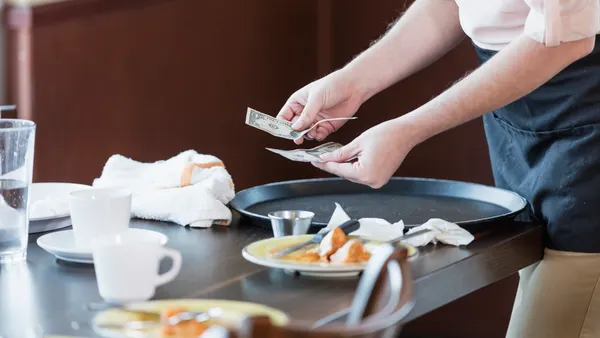Dive Brief:
- Employers that applied for more than $150,000 in relief from the Paycheck Protection Program (PPP) generally saw a positive impact in employment, finances and business continuity, according to an October analysis published by the National Bureau of Economic Research.
- The PPP, a federal business relief effort which took effect in April and closed in September, played "a significant role in the health and viability of small businesses," the researchers wrote, though they stopped short of deeming it a success or a failure, saying it's too early to tell.
- Researchers noted, however, that there may have been other options that could have done a better job of supporting businesses. While the original PPP was designed for a shorter pandemic and "[s]ubsequent changes to PPP addressed these concerns," changes could have gone further, they said. "The economy overall, including workers, will benefit from a fast transition from the pre- to post-lockdown equilibrium. PPP could facilitate this transition by eliminating any link between PPP loan forgiveness and pre-crisis employment levels."
Dive Insight:
As shutdowns began across the country in March, restaurant owners expressed fear they would need to make layoffs, cut pay or hours, or even shut down, and a staggering number of eateries have already closed permanently. The National Restaurant Association also predicts that the restaurant segment will lose $240 billion by the end of the year.
The PPP was passed as part of the Coronavirus Aid, Relief, and Economic Security (CARES) Act and added more flexible terms in June. The initial funding ran out quickly, though the changes in June included additional funds, and some employers avoided the program or even returned loans without using them.
Lawmakers and research organizations criticized the PPP, citing evidence that businesses owned by women or nonwhite individuals saw disproportionate losses and closures during the pandemic. Additionally, the Center for Responsible Lending said that "well-connected, wealthier companies," received preference from banks, which failed "to provide benefits to the vast majority of businesses owned by people of color," in an April 16 statement. In July, Restaurant Business reported that only 130 black-owned restaurants received PPP loans of $150,000 or more, though some business owners that applied for loans did not disclose their race.
With a new presidential administration likely to take over, multiple sources that spoke with HR Dive said they expect COVID-19 relief will be a priority. A Biden administration would likely focus on workplace safety and a relief package for businesses, they said. But it's unclear if this will translate to restaurant-specific aid. The industry has been pushing for legislators to support the Restaurant Act, which would provide restaurants with $120 billion in funding. Both the NRA and Independent Restaurant Coalition support this proposal.
"The RESTAURANTS Act is the only bipartisan measure designed specifically to address the unique vulnerabilities of America's 500,000 independent restaurants," the IRC said in a statement in July. "It also props up countless other industries and millions of jobs up and down the supply chain."












